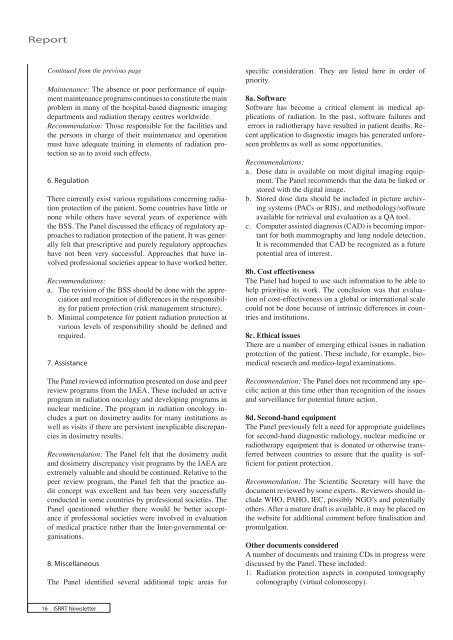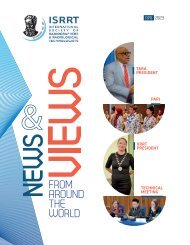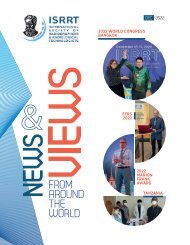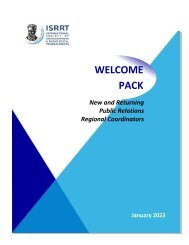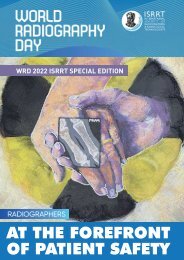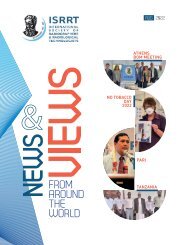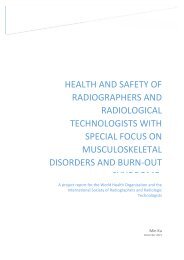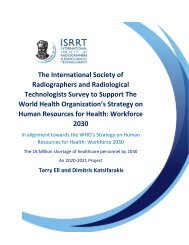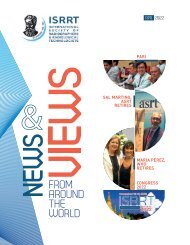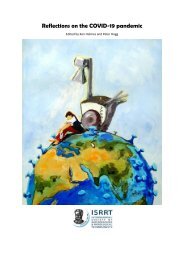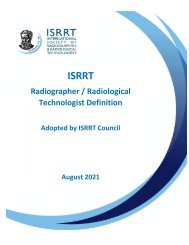ISRRT_August_2006
You also want an ePaper? Increase the reach of your titles
YUMPU automatically turns print PDFs into web optimized ePapers that Google loves.
Report<br />
Continued from the previous page<br />
Maintenance: The absence or poor performance of equipment<br />
maintenance programs continues to constitute the main<br />
problem in many of the hospital-based diagnostic imaging<br />
departments and radiation therapy centres worldwide.<br />
Recommendation: Those responsible for the facilities and<br />
the persons in charge of their maintenance and operation<br />
must have adequate training in elements of radiation protection<br />
so as to avoid such effects.<br />
6. Regulation<br />
There currently exist various regulations concerning radiation<br />
protection of the patient. Some countries have little or<br />
none while others have several years of experience with<br />
the BSS. The Panel discussed the efficacy of regulatory approaches<br />
to radiation protection of the patient. It was generally<br />
felt that prescriptive and purely regulatory approaches<br />
have not been very successful. Approaches that have involved<br />
professional societies appear to have worked better.<br />
Recommendations:<br />
a. The revision of the BSS should be done with the appreciation<br />
and recognition of differences in the responsibility<br />
for patient protection (risk management structure).<br />
b. Minimal competence for patient radiation protection at<br />
various levels of responsibility should be defined and<br />
required.<br />
7. Assistance<br />
The Panel reviewed information presented on dose and peer<br />
review programs from the IAEA. These included an active<br />
program in radiation oncology and developing programs in<br />
nuclear medicine. The program in radiation oncology includes<br />
a part on dosimetry audits for many institutions as<br />
well as visits if there are persistent inexplicable discrepancies<br />
in dosimetry results.<br />
Recommendation: The Panel felt that the dosimetry audit<br />
and dosimetry discrepancy visit programs by the IAEA are<br />
extremely valuable and should be continued. Relative to the<br />
peer review program, the Panel felt that the practice audit<br />
concept was excellent and has been very successfully<br />
conducted in some countries by professional societies. The<br />
Panel questioned whether there would be better acceptance<br />
if professional societies were involved in evaluation<br />
of medical practice rather than the Inter-governmental organisations.<br />
8. Miscellaneous<br />
The Panel identified several additional topic areas for<br />
specific consideration. They are listed here in order of<br />
priority.<br />
8a. Software<br />
Software has become a critical element in medical applications<br />
of radiation. In the past, software failures and<br />
errors in radiotherapy have resulted in patient deaths. Recent<br />
application to diagnostic images has generated unforeseen<br />
problems as well as some opportunities.<br />
Recommendations:<br />
a. Dose data is available on most digital imaging equipment.<br />
The Panel recommends that the data be linked or<br />
stored with the digital image.<br />
b. Stored dose data should be included in picture archiving<br />
systems (PACs or RIS), and methodology/software<br />
available for retrieval and evaluation as a QA tool.<br />
c. Computer assisted diagnosis (CAD) is becoming important<br />
for both mammography and lung nodule detection.<br />
It is recommended that CAD be recognized as a future<br />
potential area of interest.<br />
8b. Cost effectiveness<br />
The Panel had hoped to use such information to be able to<br />
help prioritise its work. The conclusion was that evaluation<br />
of cost-effectiveness on a global or international scale<br />
could not be done because of intrinsic differences in countries<br />
and institutions.<br />
8c. Ethical issues<br />
There are a number of emerging ethical issues in radiation<br />
protection of the patient. These include, for example, biomedical<br />
research and medico-legal examinations.<br />
Recommendation: The Panel does not recommend any specific<br />
action at this time other than recognition of the issues<br />
and surveillance for potential future action.<br />
8d. Second-hand equipment<br />
The Panel previously felt a need for appropriate guidelines<br />
for second-hand diagnostic radiology, nuclear medicine or<br />
radiotherapy equipment that is donated or otherwise transferred<br />
between countries to assure that the quality is sufficient<br />
for patient protection.<br />
Recommendation: The Scientific Secretary will have the<br />
document reviewed by some experts. Reviewers should include<br />
WHO, PAHO, IEC, possibly NGO’s and potentially<br />
others. After a mature draft is available, it may be placed on<br />
the website for additional comment before finalisation and<br />
promulgation.<br />
Other documents considered<br />
A number of documents and training CDs in progress were<br />
discussed by the Panel. These included:<br />
1. Radiation protection aspects in computed tomography<br />
colonography (virtual colonoscopy).<br />
16 <strong>ISRRT</strong> Newsletter


